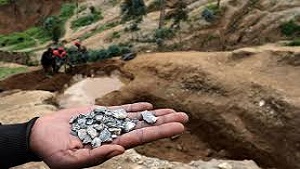According to a confidential report by a group of United Nations (UN) experts reviewed by Reuters, the purchases helped fund an insurgency in the DRC.
The UN report marks the first time the world body has named a company that’s purportedly complicit in trafficking minerals looted from Congo since M23 insurgents seized a key mining area there last year. Boss Mining was named in the UN report, which documents how recent territorial gains in Congo by M23 have further destabilized a region beset by decades of conflict.
The heavily armed rebels, whose stated aim is to overthrow the government in Kinshasa and ensure the safety of the Congolese Tutsi minority, have been accused by the UN of plundering Congo’s natural resources and committing atrocities against civilians, backed by the government of neighboring Rwanda.
Illegal mining in M23-controlled areas and the smuggling of these minerals to Rwanda have “reached unprecedented levels,” the report said.
The report was submitted to the UN Security Council sanctions committee for Congo in early May and is due to be published soon, diplomats told Reuters.
M23 did not respond to requests for comment.
Boss Mining’s operations are run by Eddy Habimana, a Rwandan businessman, corporate records reviewed by Reuters show UN investigators identified, opens new tab Habimana a decade ago as a minerals smuggler connected to rebels waging war in eastern Congo.
Habimana declined to comment on the allegations in the unpublished UN Report.
Two Russia-born mining executives are also owners in Boss Mining, according to the Rwandan corporate records.
Yolande Makolo, Rwanda government spokesperson, told Reuters on Wednesday the UN report "misrepresents Rwanda's longstanding security concerns" about Hutu rebel groups that have attacked ethnic Tutsis in both Rwanda and Congo, a threat that "necessitates the defense posture in our border areas."
A Congolese government spokesman did not immediately respond to questions from Reuters, but Democratic Republic of Congo (DRC) officials have repeatedly accused Rwanda of fomenting the conflict to plunder DRC's mineral wealth.
Sales from the mineral trade have been critical to funding M23’s rebellion. The insurgents this year swept across large swathes of eastern DRC that are home to the country’s largest coltan mine as well as mines producing gold, copper, tin and gemstones.
A Reuters analysis of customs records from 2024 found that Boss Mining is one of a number of Rwandan companies that export significant volumes of coltan despite the fact that Rwanda produces little of the metallic ore.
Rubaya, the DRC mining area now controlled by M23, produces 15% of the world’s coltan.
The ore is processed into a heat-resistant metal called tantalum that’s in high demand from makers of mobile phones, computers and other applications in the electronics, aerospace and medical industries.
Early this year, M23 insurgents seized the DRC border cities of Bukavu and Congo, giving them control of two key crossings into Rwanda. It is through these cities that smuggled Congolese minerals are trucked to Rwanda, often at night “to avoid detection,” according to the forthcoming UN report. The report said 195 tons came across in the last week of March alone. Some of the smuggled minerals were purchased by Boss Mining, the report said.
In previous text messages to Reuters in June responding to questions about Boss Mining’s operations, Habimana said his company has “never been involved in purchasing coltan from Rubaya.”
“All materials we buy are in compliance" with international guidelines meant to ensure that mining isn't used to fund armed groups or contribute to human rights abuses, he said.
M23’s lightning advance in eastern has re-ignited a decades-old conflict that has its origins in Rwanda’s 1994 genocide and has displaced millions of people. The rebels have vowed to overthrow the DRC government.
Rwanda’s government has long denied that it traffics in coltan looted from its neighbor or that it backs M23. But Rwanda’s ruling party, mainly headed by Tutsis, shares the same concerns as the Tutsi-dominated M23 insurgents over the purported threat posed by rival Hutu groups operating in eastern DRC. As of April, Rwanda had at least 1,000 troops in Congo, according to the confidential UN report.
On Friday, Rwanda and Congo signed a US-brokered peace agreement that aims to arrange for the withdrawal of Rwandan troops from Congo’s territory. The accord does not include M23. The rebel group is part of a separate, parallel mediation led by Qatar that seeks to end hostilities. The success of those talks is key to any lasting peace.
--Reuters--
Economy
- ${title}
Loading...
Economy
Major Rwandan coltan exporter bought smuggled minerals: UN Report

Date: Jul 3, 2025
Rwandan company Boss Mining Solution bought minerals smuggled from rebel-held areas of the neighbouring Democratic Republic of Congo (DRC).
Web Content Viewer (JSR 286)
- ${title}
Loading...
ADVERTISEMENT
Economy
- ${title}
Loading...
Web Content Viewer (JSR 286)
- ${title}
Loading...









